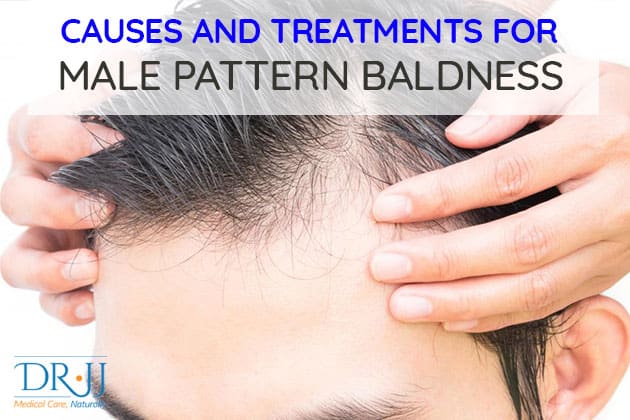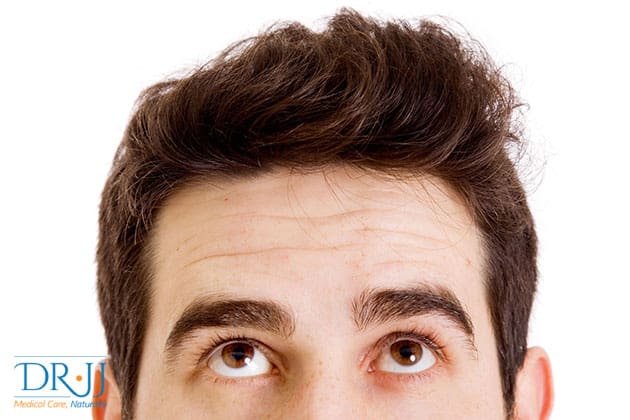
Male pattern baldness, also known as androgenetic alopecia, is a common complaint amongst men as they age.
More recently, I have seen men with hair thinning or loss in their 20s and 30s.
Often hair loss will begin at the temples and then thins to a bald spot, or possibly total baldness over the crown.
Even though genetics comprise a large part in how your hair loss will manifest, there are steps you can take to reduce your likelihood of baldness, and to hopefully regain some fullness to your follicles.
One of the common issues leading to male pattern baldness is deficiency in certain nutrients.
As a naturopathic doctor certified to provide intravenous infusion therapy, I can provide treatments to address your nutritional deficiencies which may be leading to your thinning hairline and may prevent it from getting any worse.
I’ll create a tailored treatment plan after going over the details of your symptoms during our first naturopathic appointment.
Now, let’s find out more about male pattern baldness.
Effects of Male Pattern Baldness
Several studies have been done on the effects of hair loss in men.
It should be no surprise that men take a huge hit to their self-esteem and confidence when they experience hair loss.
This can create added stress and anxiety.
One common reason men seek help may be all about image.
Another reason is they suspect there may be an underlying cause that simply needs correcting in order to reverse the loss or thinning, and prevent a more serious condition down the road, e.g. prostate enlargement (BPH), nutritional deficiencies.
Causes Of Male Pattern Baldness
Researchers are actively working to create a prediction algorithm to better determine those at risk of developing male pattern baldness.
In the meantime, the first step to halting the retreat of your hairline is to look at some of the causes, and see if you fall into any of these categories.
There are many problems that could contribute to male pattern baldness, and we need to unlock which one is the culprit, in order to look at treatments.
1. Hypothyroidism
Hypothyroidism is when one’s thyroid doesn’t create enough hormones.
This can be caused when the immune system attacks the thyroid gland, e.g. Hashimoto’s, Graves disease (following thyroid surgery or radioactive iodine treatment), when the thyroid is removed, or simply due to other causes.
Hair loss is rare for those with a mild condition, but in prolonged or severe cases, hair loss is a known side effect.
Hypothyroid hair loss pattern means the hair falls out from all over the head, not in clumps or patches, and may regrow once treatment is started.
If you’re experiencing this, then selenium is a good mineral for us to explore to support your thyroid health.
2. Nutritional Deficiencies
Hair follicles are built from a protein called keratin, which is produced by the body.
The nutrients that regulate the keratin production are what you absorb through your food.
One of the first things you can do to have healthy hair is to improve your diet.
The best foods to choose are: eggs, berries, spinach, fish, sweet potatoes, avocados, nuts & seeds.
These foods have the best combination of vitamins and minerals for hair health, including vitamin A, biotin, vitamin B6, & the other B vitamins, vitamin C, vitamin D, vitamin E, omega 3 fatty acids and zinc.
However, if your nutritional deficiencies are a result of a digestive disorder that impacts your ability to absorb nutrients, dietary improvements won’t have as great an effect.
In cases like this, it’s a good idea to come see me for an intravenous (IV) infusion treatment.
IV therapy for digestive issues can provide you with the nutrients you need to address your digestive disorder, addressing the root cause of your nutritional deficiencies.
3. Celiac Disease
Celiac disease is an autoimmune reaction to gluten, which is found in wheat, spelt, kamut, barley and rye.
If you suffer from Celiac disease, whenever you eat gluten your body will trigger an immune response in your small intestine that leads to inflammation.
This inflammation prevents the absorption of nutrients.
Going back to the nutritional deficiencies paragraph above, remember that not absorbing enough vitamins, essential fats and minerals can hinder hair production and growth, causing thinning and loss.
Once celiac disease has been identified and gluten is removed from your diet, your hair will hopefully begin growing again.
4. Side Effects Of Prescription Drugs
While many people expect to lose hair during radiation or chemotherapy treatments, there are other prescription drugs that also cause hair loss.
Blood thinners could be the culprit, as well as anabolic steroids, beta blockers, high vitamin A doses, or certain hormone supplements.
If this is the case, come in to see me for a consultation.
We’ll take a look at the prescription drugs you’re taking, and how we can counteract their side effects without interfering with their primary function.
5. Genetics
Genetics is one of the greatest factors – saved for last – because it’s the one we can’t do much about.
Sometimes the best we can do is slow down nature.
Hair developed in mammals to keep us warm, so the biology behind hair growth and regulation is necessarily very complicated.
Translated, that amounts to: we know there’s a significant hereditary component to male pattern baldness, but we don’t know exactly what it is or how it can best be managed.

Naturopathic Treatments For Male Pattern Baldness
There are many methods for treating male pattern baldness, and while each patient wants the same full head of hair, each patient also requires their own completely separate strategy.
Here are some of the herbs and plants that you can use to help.
1. Saw Palmetto
If you’ve ever been to Florida or the southeastern US, you’ve definitely seen saw palmetto (mini palm trees).
What you may not have realized is that they are powerhouses for helping your hair.
Your body turns testosterone into a molecule called DHT, which causes your hair follicles to shrink; when this happens, it results in hair loss.
Saw palmetto berries block 5-alpha-reductase, which is the enzyme that actually converts the testosterone to DHT.
Once this is blocked, less testosterone converts to DHT, which prevents the shrinking and loss of hair follicles.
2. Ashwagandha
Ashwagandha is a shrub whose various parts have been used for centuries in Ayurvedic medicine.
It has been used to boost attributes of strength and endurance.
It also helps the body to cope with stress and can help improve your sleep.
Ashwagandha has been used to help with brain function and memory loss, boosting energy, balancing hormones, and also improving skin and hair growth.
3. Rosemary Oil
Rosemary oil is a wonderfully scented addition to your hair care regime – and when you read how it helps, it’ll be no wonder it’s found in so many shampoos.
Rosemary oil is an anti inflammatory, a memory booster, helps with dandruff, reduces itchiness in skin, promotes nerve growth, and strengthens circulation.
It’s very easy to use rosemary oil.
Put two or three drops in your palm with a squeeze of shampoo, and massage it directly in your hair.
Alternately, add a few drops to some olive or coconut oil, massage into your roots and let sit for 5-10 minutes before washing it out.
Questions? Ask Dr. JJ!
While male pattern baldness is often linked to heredity, it can also be an indicator for several conditions, so it’s never a bad idea to see a doctor if you notice your hair falling out.
However, I know how much a youthful looking, full head of hair means to a man’s self image.
If you’re dealing with male pattern baldness, I encourage you to book an appointment with me.
Together, we’ll explore what can be done to maintain and restore your mane.
Book your appointment with me, Dr. JJ, today.
If you have questions about naturopathic medicine, or you’d like to take your first step into the world of naturopathy, contact me, Dr. JJ, and let’s book an appointment.
Yours in health,
Dr. JJ Dugoua, Naturopathic Doctor
600 Sherbourne St, Suite 315,
Toronto, ON M4X 1W4
-https://goo.gl/maps/6VDXwiCihRpDRo5A9
Dr. JJ Dugoua is a naturopathic doctor in Toronto and has a PhD in Pharmaceutical Sciences. His clinic provides solutions for many health concerns and has a special focus on thyroid health issues.


